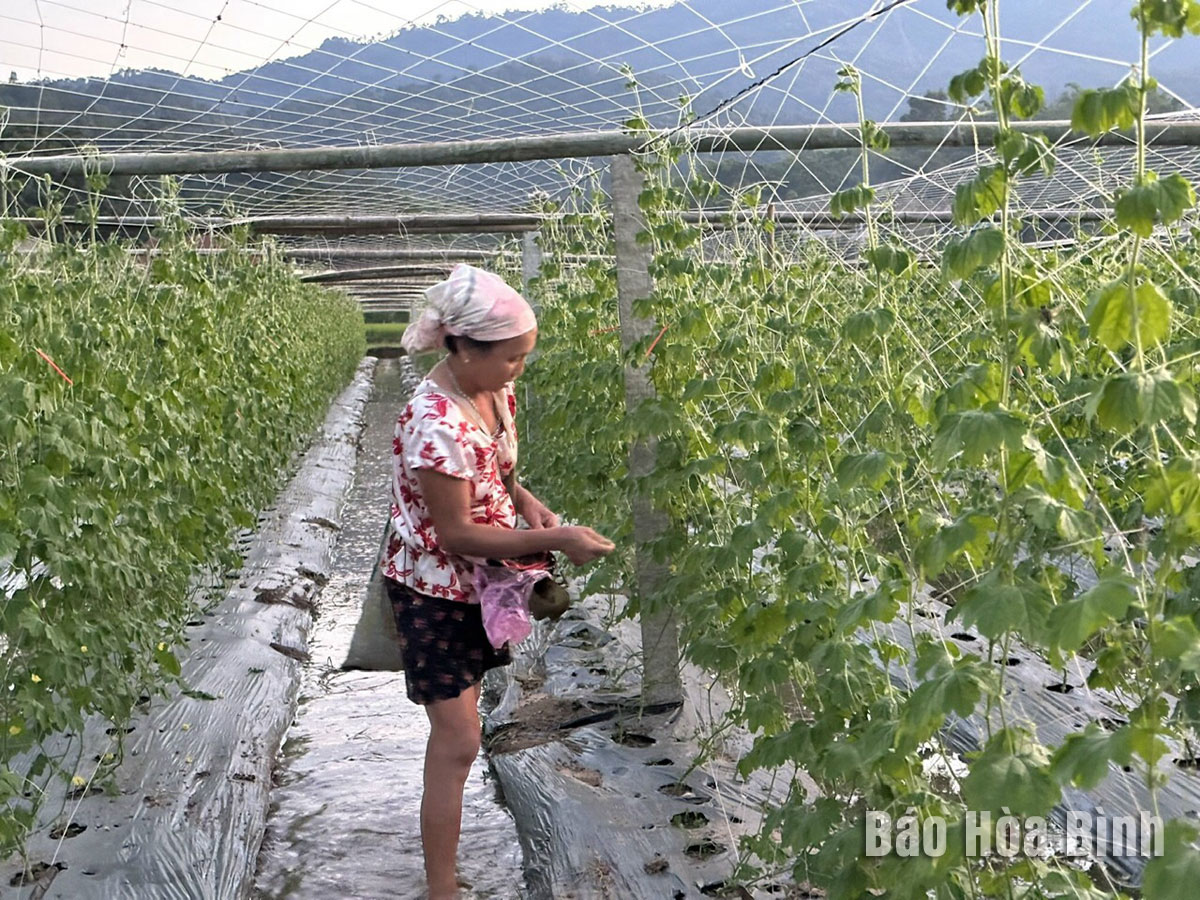
Over the past years, Mai Chau district has put in place programmes, projects, and policies on ethnic minority groups, in tandem with specific tasks and solutions to improve their material and spiritual life.
Caption: Residents in Mai Hich commune, Mai Chau district, grow bitter gourd that yields high economic values.
Between 2021 and 2023, the district has completed the first phase of the Tau Na resettlement area in Cun Pheo commune, and another in Suoi Nhung hamlet, Son Thuy commune.
Last year, 30 households received support in livelihood change with funding of 300 million VND (12,372 USD), and the numbers are expected to rise to 50 households and 500 million VND this year.
With central, provincial, and district budgets, in the 2021 - 2023 period, the district has launched 173 projects worth 523 billion VND which have contributed to improving local infrastructure, thus gradually meeting socio-economic requirements.
To date, the district People’s Committee has approved investment plans for 29 projects with a total registered capital of over 2.01 trillion VND, of them 16 operational.
Apart from infrastructure development, the district has focused on agricultural restructuring; afforestation, striving to keep the forest coverage at 65.44%; tapping water surface potential for aquaculture; and opening vocational training classes for rural labourers.
Over the past two years, the district has coordinated to open 35 classes with the participant of 1,103 people, mainly in tour guide, brocade weaving, husbandry, farming, agricultural machine repair, and cooking.
Ha Cong Nghi, Permanent Deputy Secretary of the district Party Committee, said Mai Chau will continue to build, develop and replicate livelihood models, and implement the national target programmes for socio-economic development in ethnic minority-inhabited and mountainous areas in the time ahead.
The Standing Board of the Hoa Binh provincial Party Committee has agreed in principle on a proposal by the Standing Board of the Party Committee of Hoa Binh city to gather feedback on the city’s 1:2000 zoning plan, which forms part of its broader urban development strategy.
Hoa Binh province has made notable progress in public administration reform and digital government development, with the satisfaction index among citizens and businesses reaching over 84%, according to recent government evaluations.
Thanks to great efforts by local authorities in recent times, the governance and public administration performance of Mai Chau district has been significantly improved.
In the afternoon of June 6, the Party Committee, the People's Council, the People's Committee and the Fatherland Front of Lac Son district solemnly held a meeting to celebrate the 139th anniversary of the district's founding (1886–2025) and the 79th anniversary of the establishment of the district's Party Committee (1946–2025). There was the attendance of Mr. Bui Van Thang, the Vice Chairman of the Provincial People's Council; Mr. Quach Tat Liem, the Vice Chairman of the Provincial People's Committee; Ms. Dang Bich Ngoc, the Deputy Head of the National Assembly Delegation of the province; as well as the former leaders of the province and district through various periods, who are the natives of the district.
Implementing the Politburo’s Resolution No. 57-NQ/TW on breakthroughs in science – technology, innovation, and digital transformation is a golden opportunity for the northern mountainous province of Hoa Binh to renew growth model, improve competitive edge and shorten digital gap.
Resolution 57-NQ/TW, issued by the Politburo on December 22, 2024, identifies sci-tech, innovation, and digital transformation as strategic breakthroughs to build a developed and prosperous nation. In Hoa Binh province, this spirit is not just a slogan, it’s being put into action through concrete initiatives that form a "new development triangle”: digital citizenship, digital economy, and digital administration.



